Carl Lewis: Track Is Dying, Long Jump Is 'Pathetic,' US Men Are 'Terrible'
Carl Lewis: Track Is Dying, Long Jump Is 'Pathetic,' US Men Are 'Terrible'
When you have won more Olympic gold medals than any track and field athlete in history, you basically have a lifetime platform to express your unadulterated
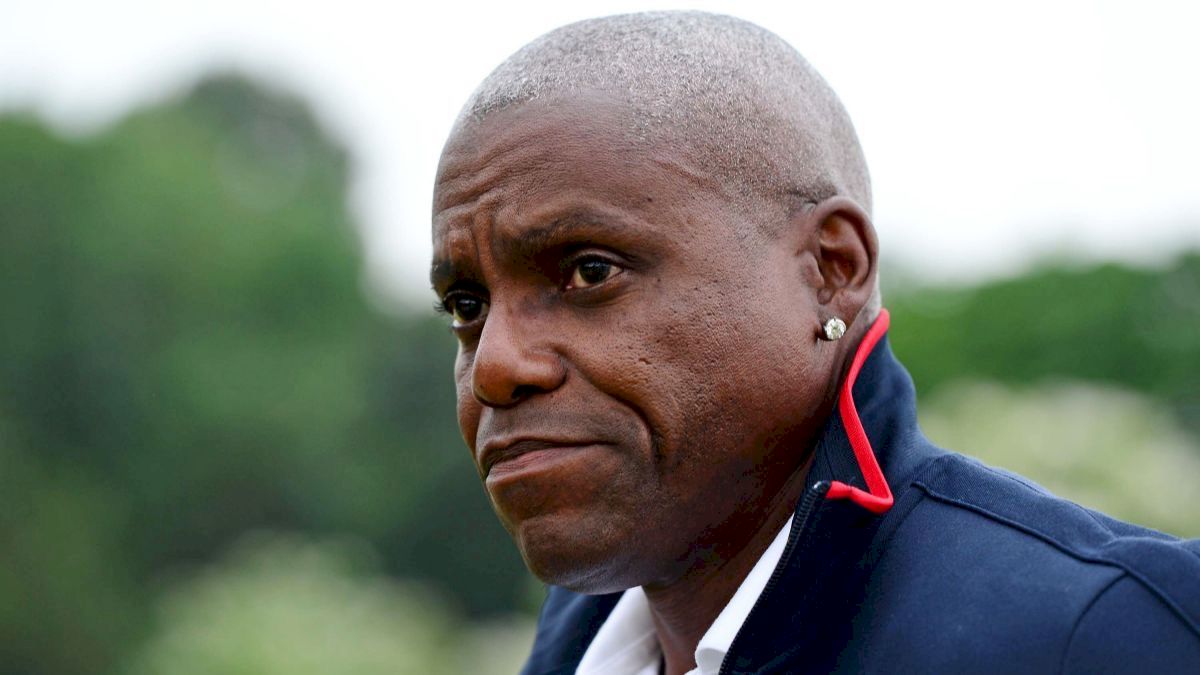
When you have won more Olympic gold medals than any track and field athlete in history, you basically have a lifetime platform to express your unadulterated opinions about the state of the sport.
And people will stop, listen, and take notes.
Such was the case Tuesday, when nine-time Olympic gold medalist Carl Lewis was trotted out in front of the media at the USOC Media Summit in support of the Los Angeles 2024 Olympic bid.
Not surprisingly, the outspoken 54-year-old stepped to the mic and let loose on a number of track and field topics – and hit the proverbial nail on the head with each of them. Here is a breakdown of Lewis’ opinions.
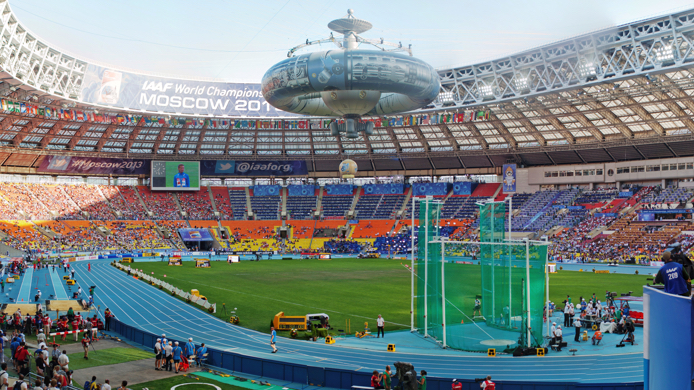
With a twinge of nostalgia in his voice, Lewis recalled routinely competing before packed stadiums both in America and across the world.
But those days are long gone.
“The World Championships averages around 25,000 people a meet, 60 percent of the track meets that were around 20 years ago are gone. Sponsorship is gone,” Lewis said. “The sport’s dying right now. When Michael Johnson, myself, Jackie Joyner-Kersee, Edwin Moses — all of us left, the sport was at a pinnacle.
“It’s been in a steady decline ever since. Everyone’s talking about how great the sport is. But go back and look at the films of Rome or Helsinki — there were 60,000 people in the stands.”
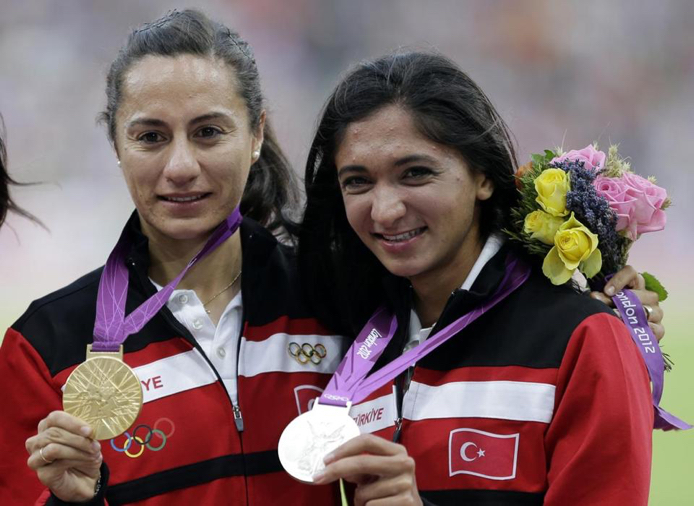
Scandal is a big reason why fans have fled.
The pervasive nature of doping in the sport, and the levels of corruption in sweeping the issue under the rug, have made track and field about as trustworthy as Suge Knight on the Las Vegas strip (which is to say not at all).
Lewis said that clean athletes have to play a larger roll in seizing back control of the sport and making it believable again.
“We should not be emotional about it,” Lewis said. “It’s not an emotional issue, it’s a business issue. Do you want your sport clean for young people coming up? Do you want it to be fair?
“If someone says (they don’t trust track), it’s our job to change their thinking. Get it together and clean your house. Athletes need to step up and do what they can do.”
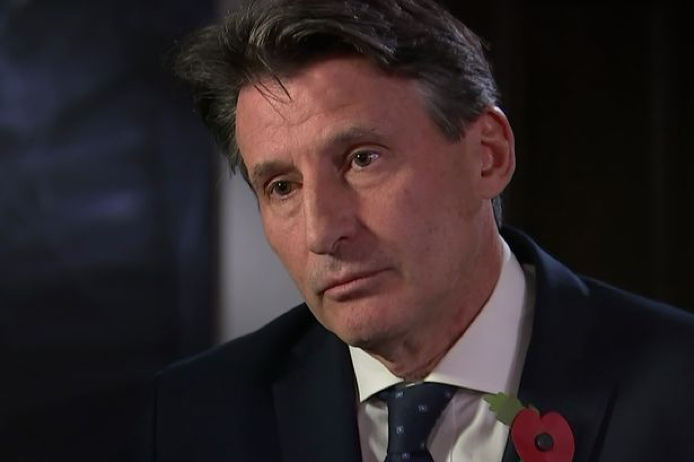
Like shoveling out the pen of an elephant with gastric distress, cleaning up track and field is going to need a group effort. Clean athletes alone are not the answer. Honorable leadership is needed.
And Lewis, who has called for worldwide independent drug testing agencies since 1987, said he is not sure that Sebastian Coe is the right man for the job at this time.
Coe was elected president of track and field’s global governing body in August, replacing Lamine Diack, who now faces criminal charges over accused widespread corruption during his watch.
An independent report commissioned by the World Anti-Doping Agency stopped short of implicating Coe of wrongdoing, but said he and members of the IAAF council, "could not have been unaware of the extent of doping" in Russia and, "could not have been unaware of the level of nepotism" under Diack.
Because of this, Lewis suggested that Coe should voluntarily step aside, allow an independent organization to sanitize track and field’s “hot mess,” and then step back in and steer the sport’s clean future.
"Seb Coe is smart enough, he's a great guy who can do this," Lewis said. "But at the end of the day, when you're talking about drugs and issues like this, you're talking about credibility. If he was willing to step aside, and let someone independent come in and really clean this up, he'd be the perfect guy to come back in and run it."
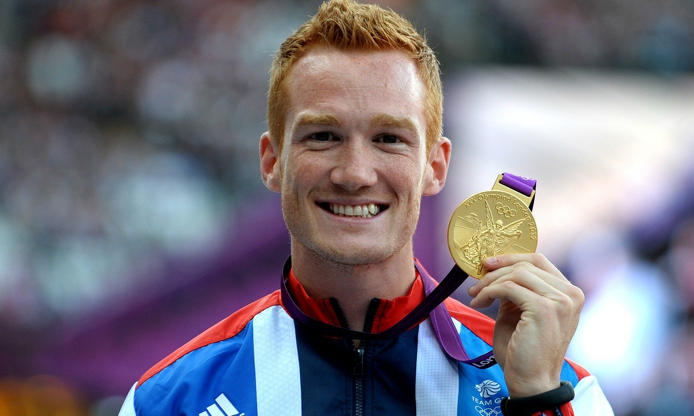
When asked more specifically about the state of some of the events he competed in, Lewis reserved some of his harshest criticism for the long jump, which he characterized as “the worst event in the world right now. Awful.”
"Jesse Owens would have been third in the last Olympics,” Lewis pointed out. “His personal best from 80 years ago would have been good enough to get him a medal in London."
So what gives?
Lewis said he believes the modern era of jumpers is less interested in challenging Mike Powell’s world record of 8.95m/29-4 ¼, which has now been on the books for 25 years, as it is in winning medals.
"Do you want to go and see someone jump 26 feet?” Lewis asked. “They don't know how to jump. And they're not trying to because they're winning medals anyway. If I jumped 26 feet I'd walk away and say, 'Don't measure that, make it a foul.' Have a standard. You don't go to the Olympics for a medal. You go for the distance. People want to go and get a medal for jumping 26 feet? Come on.”
Lewis then castigated British jumper Greg Rutherford, who won Olympic long jump gold in London at 8.31m/27-3.
“Mike (Powell) and me were jumping 28 feet regularly,” Lewis said. “But this generation? Rutherford? I'm sorry, but it's pathetic to me. He's won everything. Are you kidding me? He's doing his best. He's jumping great. But he shouldn't be winning with that."
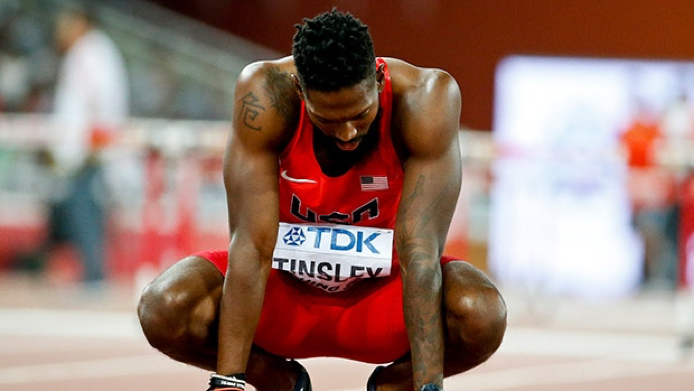
Lewis reserved the bulk of his ire for the current state of the U.S. men’s track and field team, which he thinks will perform as bleakly at the Olympics this summer as it did at the World Championships in Beijing last August, when it one just one gold medal.
"It's systemic in America," Lewis, an assistant coach at the University of Houston, said. "The coach is now likely to be a math teacher rather than a PE teacher. When I get kids in college I have to fix so much about their running it's amazing to me. Kids are being taught things that are completely incorrect."
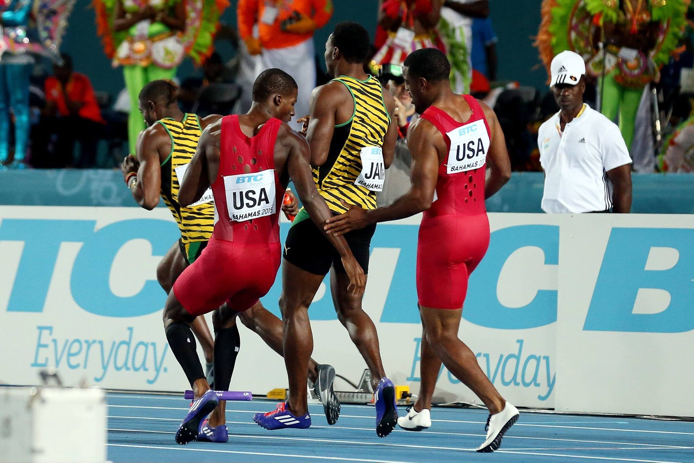
Lewis fingered coaching as also being the root cause of Team USA’s struggles in the 4x100m and 4x400m relays at the major championships.
The number of relay disasters on both the men’s and women’s side over the last 15 years is astounding.
Lewis called all of the above unacceptable.
“America can’t cross the line, so something’s going on here. Nine-year-olds never drop the stick.”
Last week, Dennis Mitchell, who coaches Justin Gatlin and was a teammate of Lewis’ at four Olympic Games, resigned as relay coach of the national team citing a USATF rule change that prohibits the coach of an athlete likely to be part of the relay pool from coaching a relay. Mitchell’s successor has not yet been named.
Lewis, who said he does not have the time to step into the role nor has he been asked to, believes a college coach would be best because “they’re not mixed in the middle of the mess.”
“(Currently), the focus is not on being the best team,” Lewis added. “It’s all the drama; the agents in the middle. It’s a mess. Somebody needs to tell them all to go sit in the stands.”
And people will stop, listen, and take notes.
Such was the case Tuesday, when nine-time Olympic gold medalist Carl Lewis was trotted out in front of the media at the USOC Media Summit in support of the Los Angeles 2024 Olympic bid.
Not surprisingly, the outspoken 54-year-old stepped to the mic and let loose on a number of track and field topics – and hit the proverbial nail on the head with each of them. Here is a breakdown of Lewis’ opinions.
Where did all the people go?

With a twinge of nostalgia in his voice, Lewis recalled routinely competing before packed stadiums both in America and across the world.
But those days are long gone.
“The World Championships averages around 25,000 people a meet, 60 percent of the track meets that were around 20 years ago are gone. Sponsorship is gone,” Lewis said. “The sport’s dying right now. When Michael Johnson, myself, Jackie Joyner-Kersee, Edwin Moses — all of us left, the sport was at a pinnacle.
“It’s been in a steady decline ever since. Everyone’s talking about how great the sport is. But go back and look at the films of Rome or Helsinki — there were 60,000 people in the stands.”
Track fans can’t believe their eyes

Scandal is a big reason why fans have fled.
The pervasive nature of doping in the sport, and the levels of corruption in sweeping the issue under the rug, have made track and field about as trustworthy as Suge Knight on the Las Vegas strip (which is to say not at all).
Lewis said that clean athletes have to play a larger roll in seizing back control of the sport and making it believable again.
“We should not be emotional about it,” Lewis said. “It’s not an emotional issue, it’s a business issue. Do you want your sport clean for young people coming up? Do you want it to be fair?
“If someone says (they don’t trust track), it’s our job to change their thinking. Get it together and clean your house. Athletes need to step up and do what they can do.”
IAAF needs a new head janitor

Like shoveling out the pen of an elephant with gastric distress, cleaning up track and field is going to need a group effort. Clean athletes alone are not the answer. Honorable leadership is needed.
And Lewis, who has called for worldwide independent drug testing agencies since 1987, said he is not sure that Sebastian Coe is the right man for the job at this time.
Coe was elected president of track and field’s global governing body in August, replacing Lamine Diack, who now faces criminal charges over accused widespread corruption during his watch.
An independent report commissioned by the World Anti-Doping Agency stopped short of implicating Coe of wrongdoing, but said he and members of the IAAF council, "could not have been unaware of the extent of doping" in Russia and, "could not have been unaware of the level of nepotism" under Diack.
Because of this, Lewis suggested that Coe should voluntarily step aside, allow an independent organization to sanitize track and field’s “hot mess,” and then step back in and steer the sport’s clean future.
"Seb Coe is smart enough, he's a great guy who can do this," Lewis said. "But at the end of the day, when you're talking about drugs and issues like this, you're talking about credibility. If he was willing to step aside, and let someone independent come in and really clean this up, he'd be the perfect guy to come back in and run it."
Not making the leap

When asked more specifically about the state of some of the events he competed in, Lewis reserved some of his harshest criticism for the long jump, which he characterized as “the worst event in the world right now. Awful.”
"Jesse Owens would have been third in the last Olympics,” Lewis pointed out. “His personal best from 80 years ago would have been good enough to get him a medal in London."
So what gives?
Lewis said he believes the modern era of jumpers is less interested in challenging Mike Powell’s world record of 8.95m/29-4 ¼, which has now been on the books for 25 years, as it is in winning medals.
"Do you want to go and see someone jump 26 feet?” Lewis asked. “They don't know how to jump. And they're not trying to because they're winning medals anyway. If I jumped 26 feet I'd walk away and say, 'Don't measure that, make it a foul.' Have a standard. You don't go to the Olympics for a medal. You go for the distance. People want to go and get a medal for jumping 26 feet? Come on.”
Lewis then castigated British jumper Greg Rutherford, who won Olympic long jump gold in London at 8.31m/27-3.
“Mike (Powell) and me were jumping 28 feet regularly,” Lewis said. “But this generation? Rutherford? I'm sorry, but it's pathetic to me. He's won everything. Are you kidding me? He's doing his best. He's jumping great. But he shouldn't be winning with that."
U.S. men will lay an egg in Rio

Lewis reserved the bulk of his ire for the current state of the U.S. men’s track and field team, which he thinks will perform as bleakly at the Olympics this summer as it did at the World Championships in Beijing last August, when it one just one gold medal.
We gotta fix our house," Lewis said. "We hardly won any gold medals at the last Olympics in the men's side. Look at our World Championships. Terrible. We did nothing.Lewis blamed the slide on poor coaching.
"It's systemic in America," Lewis, an assistant coach at the University of Houston, said. "The coach is now likely to be a math teacher rather than a PE teacher. When I get kids in college I have to fix so much about their running it's amazing to me. Kids are being taught things that are completely incorrect."
We're relay terrible

Lewis fingered coaching as also being the root cause of Team USA’s struggles in the 4x100m and 4x400m relays at the major championships.
The number of relay disasters on both the men’s and women’s side over the last 15 years is astounding.
| Year | Meet | Event | What happened |
|---|---|---|---|
| 2015 | World Champ | M 4x1 | DQ in final (Tyson Gay to Mike Rodgers) |
| 2015 | World Relays | W 4x2 | DNF (Jeneba Tarmoh to Allyson Felix) |
| 2015 | World Relays | M 4x2 | DQ in final (Isiah Young to Curtis Mitchell) |
| 2014 | World Relays | W 4x15 | 2nd leg fall (Katie Mackey) |
| 2014 | World Relays | M 4x1 | DQ in heats (Trell Kimmons to Rakieem Salaam) |
| 2014 | World Relays | M 4x2 | DQ in final (Curtis Mitchell to Ameer Webb) |
| 2013 | World Champ | M 4x1 | Almost DQ (Mookie Salaam to Justin Gatlin) |
| 2012 | Olympics | M 4x1 | DQ (Doping: Tyson Gay) |
| 2011 | World Champ | M 4x1 | DNF (Doc Patton crash w/ Harry Aikines-Aryeetey) |
| 2009 | World Champ | W 4x1 | DNF in heats (Alexandria Anderson to Muna Lee) |
| 2009 | World Champ | M 4x1 | DQ in rounds (Doc Patton to Shawn Crawford) |
| 2008 | Olympics | M 4x1 | DNF (Doc Patton to Tyson Gay) |
| 2008 | Olympics | W 4x1 | DQ in heats (Torri Edwards to Lauryn Williams) |
| 2005 | World Champ | M 4x1 | DNF in rounds (Mardy Scales to Leonard Scott) |
| 2004 | Olympics | W 4x1 | DQ (Marion Jones to Lauryn Williams) |
| 2001 | World Champ | M 4x1 | DQ (Doping: Tim Montgomery) |
| 2001 | World Champ | W 4x1 | DQ (Doping: Marion Jones) |
Lewis called all of the above unacceptable.
USATF needs to stop the joking, stop the crap,” Lewis said. “What they need to do is get a retired college coach who is going to tell an agent that gets off, who is going to tell the athlete to get in line and know how to put together a 4x100m and know how to put together a relay.“I don’t care if he’s 75. Get a retired college coach. And that’s it. Stop these little games with the people that are spinning. It’s crap. It’s embarrassing what’s happened with the relay program. It’s embarrassing we can’t even get a baton around.
“America can’t cross the line, so something’s going on here. Nine-year-olds never drop the stick.”
Last week, Dennis Mitchell, who coaches Justin Gatlin and was a teammate of Lewis’ at four Olympic Games, resigned as relay coach of the national team citing a USATF rule change that prohibits the coach of an athlete likely to be part of the relay pool from coaching a relay. Mitchell’s successor has not yet been named.
Lewis, who said he does not have the time to step into the role nor has he been asked to, believes a college coach would be best because “they’re not mixed in the middle of the mess.”
“(Currently), the focus is not on being the best team,” Lewis added. “It’s all the drama; the agents in the middle. It’s a mess. Somebody needs to tell them all to go sit in the stands.”